
ARCHIVE FOR HISTORY OF EXACT SCIENCES
Scope & Guideline
Connecting Past Insights with Future Innovations
Introduction
Aims and Scopes
- Historical Analysis of Mathematical Concepts:
The journal focuses on the evolution of mathematical ideas and theories, tracing their development from ancient to modern times and examining their historical contexts. - Interdisciplinary Approaches:
It encourages interdisciplinary research that connects mathematics with other scientific fields such as physics, astronomy, and engineering, reflecting the interconnected nature of these disciplines throughout history. - Critical Examination of Historical Texts:
The publication emphasizes the critical analysis of historical texts and manuscripts, aiming to uncover lost knowledge and reinterpret existing theories. - Biographical Studies of Key Figures:
The journal frequently features biographical studies that highlight the contributions of significant mathematicians and scientists, providing insights into their works and the impact they had on their respective fields. - Methodological Innovations in Historical Research:
It promotes innovative methodologies in the study of the history of sciences, including the use of quantitative analysis and modern technological tools to reinterpret historical data.
Trending and Emerging
- Quantitative Approaches in Historical Research:
There is an increasing trend towards employing quantitative methods to analyze historical data, as seen in the exploration of astronomical observations and mathematical principles, reflecting a modern shift in historical methodology. - Revisiting Classical Works:
Recent papers demonstrate a resurgence in interest in classical texts and figures, such as Archimedes and Ptolemy, with new interpretations and analyses that highlight their relevance to contemporary scientific discussions. - Interdisciplinary Studies:
Emerging themes show a growing emphasis on interdisciplinary research, particularly the intersections of mathematics with physics, engineering, and even philosophy, showcasing the complexity and interconnectedness of scientific disciplines. - Cultural and Regional Studies:
There is a notable rise in research that examines the contributions of non-Western cultures and civilizations to the development of exact sciences, expanding the narrative beyond traditional Eurocentric perspectives. - Historical Contextualization of Scientific Concepts:
A trend towards contextualizing scientific concepts within their historical and cultural frameworks is evident, allowing for a richer understanding of how these ideas evolved and influenced modern science.
Declining or Waning
- Astrological and Mystical Interpretations of Sciences:
There has been a noticeable decline in papers addressing the intersection of astrology and early scientific developments, suggesting a shift away from these themes toward more empirical and mathematical analyses. - Traditional Historical Narratives:
Research that adheres strictly to traditional narratives of scientific history, without incorporating modern analytical perspectives or interdisciplinary approaches, appears to be diminishing. - Focus on Less Influential Historical Figures:
Papers focusing on lesser-known figures or those with minimal impact on the evolution of exact sciences are becoming less frequent, indicating a trend toward prioritizing influential contributors. - Static Historical Accounts:
The journal seems to be moving away from static descriptive accounts of historical events or figures in favor of dynamic analyses that consider the broader implications of scientific developments.
Similar Journals
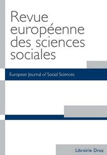
Revue Europeenne des Sciences Sociales
Discovering Innovative Perspectives on Social IssuesRevue Europeenne des Sciences Sociales, published by LIBRAIRIE DROZ SA, is a vital platform in the field of social sciences, offering a distinct focus on European social research and interdisciplinary studies. The journal, with ISSN 0048-8046 and E-ISSN 1663-4446, has been a valuable resource since its inception, covering significant themes and fostering on-going discussions in European social contexts. Although indexed coverage in Scopus has been discontinued since 2016, the journal maintains its scholarly importance, aiming to present rigorous analyses and innovative perspectives that stimulate academic discourse and contribute to a more profound understanding of social phenomena. Researchers, professionals, and students alike are encouraged to explore the journal for its rich insights and comprehensive studies that reflect the complexities of contemporary European societies.

Bollettino di Storia delle Scienze Matematiche
Connecting Past Insights with Future DiscoveriesBollettino di Storia delle Scienze Matematiche, published by FABRIZIO SERRA EDITORE, stands as a vital platform for the exploration of the rich history and philosophical underpinnings of mathematical sciences. With its origins tracing back to 2003, this journal primarily serves as an interdisciplinary forum where historians, philosophers, and mathematicians converge, reflecting the complex interplay between mathematics and its historical context. Although classified within the Q4 quartile for both the History and Philosophy of Science and Mathematics categories in 2023, the journal continues to stimulate critical discourse and encourage new avenues of research that challenge traditional narratives. While it is not an open-access publication, it is recognized for its scholarly rigor and contributes essential insights to the academic community, particularly those engaged in the nuanced study of mathematical practices through time. Researchers, professionals, and students alike will find valuable resources within its pages to inform their inquiries and broaden their understanding of the historical trajectory of mathematical thought.
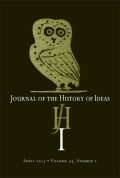
JOURNAL OF THE HISTORY OF IDEAS
Advancing Understanding of Intellectual HistoryJournal of the History of Ideas, published by the University of Pennsylvania Press, is a leading academic journal dedicated to the interdisciplinary exploration of philosophical, cultural, and intellectual history. Since its inception in 1970, the journal has provided a vital platform for scholarly discourse, serving an essential role in the study of ideas that have shaped human thought. With an impressive Q2 ranking in Philosophy and a 75th percentile ranking in the Scopus database, this journal reflects its status as a significant contributor to the field. Although it operates under traditional access options, it remains a crucial source of empirical research and theoretical discussions in the humanities. Researchers, professionals, and students alike will find the Journal of the History of Ideas an invaluable resource for understanding the evolving narratives that inform philosophical discourse and cultural practices. The journal's articles, which are rigorously peer-reviewed and available in both print and digital formats, encompass a broad spectrum of topics, ensuring comprehensive coverage of historical thought from various perspectives up to 2024.
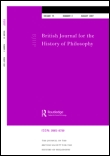
British Journal for the History of Philosophy
Navigating the Complexities of Past PhilosophiesThe British Journal for the History of Philosophy, published by ROUTLEDGE JOURNALS, TAYLOR & FRANCIS LTD, is a leading academic journal dedicated to the exploration and critical examination of historical philosophies and their implications. Founded in 1993 and operating through 2024, this quarterly publication holds a prestigious status, being ranked Q1 in Philosophy with a Scopus rank of 188 out of 806, placing it in the 76th percentile within the arts and humanities domain. The journal is unique in its commitment to showcasing interdisciplinary research, catering to scholars, professionals, and students interested in philosophical history's complexities and developments. Although it does not currently offer Open Access options, it remains an essential resource for contemporary debates and historical insights in philosophy, contributing to the wider academic discourse on ethical, epistemological, and metaphysical inquiries.

British Journal for the History of Mathematics
Connecting History, Philosophy, and MathematicsBritish Journal for the History of Mathematics, published by Taylor & Francis Ltd, serves as a vital platform for scholars engaged in the exploration of mathematical history and its impact on the evolution of education, philosophy, and science. With an ISSN of 2637-5451 and E-ISSN of 2637-5494, this journal showcases high-quality research articles that delve into the rich narratives behind mathematical concepts, theorists, and practices from ancient to modern times. Although currently categorized in the fourth quartile across key academic domains—including Education and the History and Philosophy of Science—its commitment to fostering scholarly discourse and providing accessible insights into the historical context of mathematics makes it an important resource for researchers, professionals, and students alike. While the journal may not currently offer open access, it aims to enhance visibility and dissemination of work from 2019 to 2024 and beyond, contributing to the understanding of mathematics not merely as a discipline but as a significant cultural artifact.

PHYSICS IN PERSPECTIVE
Navigating the Intersections of Time and PhysicsPHYSICS IN PERSPECTIVE, published by SPRINGER BASEL AG, is an esteemed journal dedicated to the intricate interplay between the history of physics and its contemporary implications. With an ISSN of 1422-6944 and an E-ISSN of 1422-6960, this journal has established itself as a pivotal resource for researchers, scholars, and students who seek a deeper understanding of physics through a historical lens. The journal enjoys a Q1 ranking in History and a Q3 ranking in Physics and Astronomy (miscellaneous), illustrating its significance in the arts and humanities as well as its notable contributions to physics scholarship. Published in Switzerland, it provides a unique platform for interdisciplinary dialogue, combining historical analysis with modern physics discussions. As it continues to grow through its converged years from 1999 to 2024, PHYSICS IN PERSPECTIVE remains committed to enriching the academic community and fostering innovative research that bridges the past and present of the physical sciences.
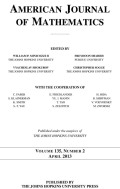
AMERICAN JOURNAL OF MATHEMATICS
Illuminating the Path of Mathematical DiscoveryAMERICAN JOURNAL OF MATHEMATICS, published by Johns Hopkins University Press, stands as a cornerstone in the field of mathematics, offering a platform for innovative and fundamental research since its inception. With an impressive Q1 ranking in the category of Mathematics (Miscellaneous), the journal showcases high-quality articles that contribute significantly to the advancement of mathematical sciences. Spanning a comprehensive range of topics from theoretical to applied mathematics, it fosters a community of academics and practitioners alike, highlighting impactful research that influences both academia and industry. Although the journal does not currently offer open access, it remains an essential resource for serious scholars, given its consistent reputation for excellence, underscored by a commendable Scopus rank of #55 out of 399 in general mathematics, placing it in the 86th percentile. With its converged years from 1996 to 2024, the AMERICAN JOURNAL OF MATHEMATICS continues to be an indispensable avenue for the dissemination and discussion of groundbreaking mathematical ideas.

History of science and technology
Connecting the dots between history, culture, and innovation.History of Science and Technology is an esteemed open-access journal published by SUIT Publishing, dedicated to advancing knowledge in the interrelated fields of history, science, technology, and their cultural implications. Since its inception in 2013, this journal has served as a vital platform for researchers, professionals, and students, fostering interdisciplinary dialogue and critical discourse on historical developments in science and technology. With an impressive reputation reflected in its 2023 Scopus rankings, where it ranks in the Q2 and Q3 quartiles across multiple related fields, it has positioned itself as a prominent resource in the academic community. The journal is particularly recognized for its contributions to archeology, museology, and the philosophy of science, making it essential reading for those engaged in these domains. Based in Kyiv, Ukraine, and operating under an open-access model, the History of Science and Technology aims to make high-quality research widely accessible, ultimately enriching the historical narrative and encouraging scholarly engagement across disciplines.
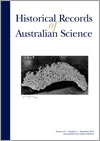
Historical Records of Australian Science
Preserving the Narrative of Scientific Progress.Historical Records of Australian Science is a premier academic journal published by CSIRO PUBLISHING, focusing on the rich legacy and contributions of Australian science from its inception to contemporary advancements. The journal is integral to the Arts and Humanities and Social Sciences fields, operating within a unique niche that fosters interdisciplinary dialogue and research. With its ISSN 0727-3061 and E-ISSN 1448-5508, it encompasses a diverse scope spanning historical analysis, philosophy of science, demography, and human factors. Although it is currently categorized into Q3 and Q4 quartiles across various relevant spheres in 2023, the journal strives for excellence in archiving pivotal scientific milestones as it continues to publish valuable insights, encouraging submissions from scholars globally. Its commitment to enriching scholarly discussion makes it a crucial resource for researchers, professionals, and students keen on exploring the historical narratives that have shaped Australia’s scientific landscape. With a convergence of knowledge from 1980 through to 2024, the Historical Records of Australian Science stands as a vital repository for those delving into Australia’s scientific heritage.

Journal of the History of the Neurosciences
Exploring the Roots of Neurological ThoughtThe Journal of the History of the Neurosciences, published by Taylor & Francis Inc, is a pivotal scholarly platform dedicated to exploring the rich historical and philosophical dimensions of neuroscience. With an ISSN of 0964-704X and E-ISSN of 1744-5213, this journal serves as a comprehensive resource for researchers, professionals, and students engaged in the intertwined fields of history, philosophy, and neuroscience. Established in 1992 and converging until 2024, it offers a unique lens through which to understand the evolution of neurological thought and practice. The journal holds a Q3 ranking in History and Philosophy of Science and a Q4 in both Neurology and Neuroscience, reflecting its dedication to fostering critical discourse in underrepresented areas. While it is not an open access journal, it remains an authoritative source, enhancing its impact through rigorous peer-review and the dissemination of significant findings. By bridging the gap between past innovations and contemporary challenges, the Journal of the History of the Neurosciences stands as an essential resource for anyone interested in the historical trajectories that have shaped modern neuroscience.